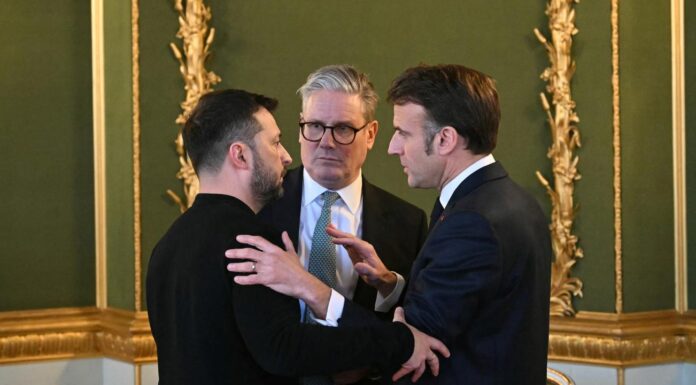Come 6 May, many EU officials in Brussels and European governments will breathe a sigh of relief. This is the day the Berlin coalition partners have scheduled the election in the Bundestag of Friedrich Merz as next German chancellor. The leader of the Christian Democrats (CDU) will need a simple majority in the Lower House of Parliament where his group and the Social Democrats (SPD) have a majority of 28 seats.
After the three-party coalition of Social Democratic chancellor Olaf Scholz, marked by unprecedented German inertia in the EU, some of Germany’s key partners like France, Poland and the Netherlands have voiced satisfaction at the forming of a new and more forceful government to tackle Europe’s security and economic challenges. Merz’ promise that they could “count on Germany again” was widely applauded.
In an eye-popping move in the outgoing Bundestag, Merz together with the SPD and the Greens paved the way for ground-breaking public spending on defence and infrastructure by orchestrating a constitutional change to Germany’s “debt brake” dogma claiming this would allow the country to catch up with long-overdue investments. The message to Europe: Germany now has the firepower to make bold policy moves.
And the chancellor-in-waiting lost no time in making clear that there is a new sheriff in town. Exhibit one: Ukraine. In a marked shift from Olaf Scholz’ repeated refusal, Merz announced that he would consider sending German-made long-range Taurus missiles to Kyiv as part of a wider European support package.
In an interview with German public broadcaster ARD, Merz suggested Europe must show strength in the face of Russian intransigence “I don’t believe Russian President Vladimir Putin will respond positively to any signs of weakness or peace offers. He needs to recognize the futility of this war”.
He said he would do this in coordination with Coalition of the Willing allies France and the UK who are already sending Scalp and Storm Shadow missile to Ukraine, saying the move “has to be coordinated, and if it is coordinated, then Germany should take part in it”.
European allies cheered Merz’s openness to sending the weapons, with Dutch Foreign Minister Caspar Veldkamp calling it an “important signal as to where Europe stands in this situation.” His Polish counterpart labelled the idea as “very good”.
However, at home, acting Defence Minister Boris Pistorius (SPD), who will likely keep his portfolio in the new government appeared lukewarm on Taurus at a recent conference in Hannover. While there are some fair points in favour of supplying the missiles, he said, there are also “good arguments against it”.
When it comes to migration and asylum policy, exhibit two of the new sheriff’s agenda, the coalition agreement echoes many of the positions that have become mainstream at the European level, including a concerted push to accelerate the deportation of asylum seekers whose applications have been rejected.
The coalition vows to use “all options available” to launch a “return offensive,” including by leveraging visa, aid and trade policies to convince countries of origin to take back their nationals, something that Brussels is also exploring, even if the agreement doesn’t explicitly endorse the controversial option of building deportation centres (so-called “return hubs”) outside EU soil.
The agreement does not explicitly endorse the controversial option of building deportation centres (so-called “return hubs”) outside EU soil but speaks about removing the connection factor that has so far prevented sending migrants to countries where they have never set foot. In its latest legislative proposal, the European Commission scrapped this condition to create the legal basis for the “return hubs.”
Furthermore, the coalition calls for maximising transfers under the Dublin Regulation, which states the first country of arrival is responsible for the asylum application. This rule, however, is often bypassed, as migrants continue their journey towards other member states. This has caused tensions between Germany and its neighbours, most notably Poland, where protests have taken place against Dublin transfers.
The agreement stipulates that German authorities will maintain temporary controls on all land borders until the Dublin Regulation is fully respected, effectively making the checks permanent. The possibility of expelling irregular migrants at the border is also contemplated, although this could prove contentious in practice. The deal underscores all potential measures will be “constitutional” and respect asylum as a “fundamental right.”
When it comes to climate policy, exhibit three, Merz and his partners place an emphasis on German politics shifting from “climate protection concerns” to economic growth – with support for “market instruments, technical solutions and reduction of red tape”.
The coalition agreement says Germany should eliminate its carbon footprint by 2045, five years ahead of the European Union’s net-zero target date. “We want to remain an industrialised country and become climate neutral,” runs the text. The incoming government also supports a European net emissions reduction target of 90% by 2040 compared to a 1990 baseline, as recommended by the EU’s climate science advisory panel and backed by the European Commission.
But there are a couple of important caveats. Firstly, the EU’s 2040 target should not require Germany to increase its own 2040 target of 88%. Significantly, it also wants leeway of up to three percentage points to be achievable by buying carbon credits from non-EU countries, backed by investments in reforestation, energy efficiency or projects to reduce emissions.
Merz’ European People’s Party (EPP) has already backed a limited use of carbon credits, with the conservative group’s environment policy coordinator and Merz ally Peter Liese saying recently that Europe must either “go for lower targets or include major flexibilities”.
The Commission, which has delayed publication of its 2040 target proposal amid doubts over political support in the European Parliament and among national governments, has also mooted the idea of allowing a degree of offsetting.
Whether Merz can bring about any of the changes he wants to pursue remains to be seen. After all, he is in a coalition government with the Social Democrats – the party that provided the chancellor for the last four years.













